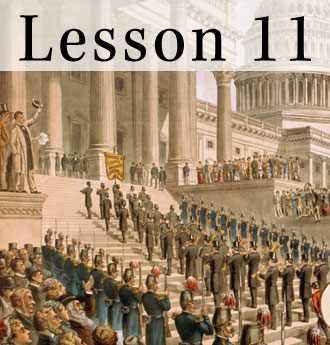Lesson 11: What basic ideas about government are included in the Preamble to the Constitution?
Henry, Patrick (1736-1799) A prominent political leader and supporter of the Revolutionary cause, Henry opposed the Philadelphia Convention and refused to attend. Henry argued against the development of a strong national government. He was suspicious of what might happen at the convention and is reported to have said "I smell a rat." Henry led opposition in Virginia to ratification of the Constitution and later worked to include the Bill of Rights in the Constitution.
Johnson, William Samuel (1727-1819) Johnson was born in Connecticut. He graduated from Yale and became a lawyer. He held a number of positions in his home state prior to the Revolution, in which he found it difficult to choose sides. He finally decided that his role should be one of peace-maker, which was what he attempted to do during the war. After the war, he was a powerful member of the Continental Congress. He played an important role in the Philadelphia Convention, serving as the chairman of the committee of style, which drafted the final document. He worked for ratification in Connecticut, which he later represented in the Senate. He retired from political office to devote his time to his position as president of Columbia College
King, Rufus (1755-1827) King was born in what is now Maine. He was the eldest son of a wealthy farmer-merchant and graduated from Harvard. He studied the law and entered practice in Massachusetts. An excellent speaker and early opponent of slavery, King served in the Massachusetts legislature and the Continental Congress. One of the youngest delegates to the Philadelphia Convention, King was also one of the best speakers, arguing for a stronger national government. His notes on the events at the convention have been of interest to historians. In 1788, King moved to New York, where he became active in state politics and was chosen as a U.S. senator several times. He also served as a director of the First Bank of the United States and as minister to Great Britain. He ran for vice president twice and president once, but lost all three times.
Madison, James (1751-1836) The "Father of the Constitution" was born to a wealthy Virginia family. He was taught at home and in private schools, then graduated from the College of New Jersey. While deciding whether to become a lawyer or minister, Madison became involved in the revolutionary cause, thereby entering state and local politics. His poor health kept him from serving in the military. In 1780, Madison was chosen to serve in the Continental Congress, where he played a major role. He was one of the most influential voices calling for a constitutional convention. He came to the Philadelphia Convention with a plan for the new government, took extensive notes on the proceedings, spoke more than 150 times, and worked tirelessly on various committees. As one of the authors of The Federalist, Madison was also a key figure in the battle for ratification. Following the convention, Madison served as a member of the U.S. House of Representatives, helping to frame the Bill of Rights and organize the executive department. Under Jefferson, Madison served as secretary of state. He then succeeded Jefferson as president. In retirement, Madison continued to speak out on public issues.
Morris, Gouverneur (1752-1816) Morris was born in New York to a wealthy family with a history of public service. Early in life, he lost a leg in a carriage accident. He graduated from King's College in New York City and studied law. Many of his family and friends were loyalists, but Morris sided with the patriots. He served in the militia as well as in the New York legislature and the Continental Congress. When he was defeated for Congress in 1779, Morris moved to Philadelphia to practice law. At the Philadelphia Convention, Morris gave more speeches than anyone else. He favored a strong national government ruled by the upper classes. He served on many committees and was the primary author of the actual document. After the convention, Morris spent ten years in Europe. He served briefly in the Senate, but then retired.




